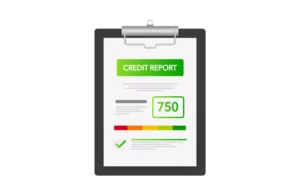TABLE OF CONTENTS
- Understanding Credit Reporting Agencies, Scores, and Reports
- What’s the Difference Between TransUnion and Equifax?
- TransUnion vs Equifax: Which Is More Important?
- Equifax Score vs TransUnion Score: How Are They Calculated?
- Why Are Equifax and TransUnion Scores Different?
- Can I Check My TransUnion and Equifax Credit Scores?
- How Can I Dispute Something on My Credit Report?
- Equifax vs TransUnion Offerings
- TransUnion vs Equifax: Final Thoughts
While TransUnion and Equifax are both major credit reporting bureaus, there are differences between the two. If you pull your Equifax and TransUnion credit reports, your credit scores from these bureaus may vary. To help you understand the variation in these scores, this guide examines the primary distinctions between TransUnion’s and Equifax’s credit score calculation algorithms. We also touch on the different products offered by these two bureaus and how to dispute credit report mistakes with each. Let’s get started!
Understanding Credit Reporting Agencies, Scores, and Reports

Forms of credit assessment have been around for quite some time, but the modern credit landscape did not emerge until the early 19th Century. As the Industrial Revolution began in the United States, lenders needed more effective means of evaluating the creditworthiness of consumers and businesses. As a result, commercial credit ratings arose in the 1850s. However, many of the many of the firms currently providing consumer credit ratings did not emerge until the early 20th Century.[1]Time. “The Long, Twisted History of Your Credit Score“. Accessed September 23, 2022.
Presently, three major credit reporting bureaus dominate the consumer credit landscape: Experian, Equifax, and TransUnion. These agencies collect data, such as debt details, payment history, credit inquiries, utilization rates, and public filings to determine consumers’ creditworthiness. These data points are documented in credit reports. Additionally, this data is put into an advanced algorithm to generate a credit score. This easy-to-understand number quickly communicates credit risk to lenders, landlords, and other interested parties.
What’s the Difference Between TransUnion and Equifax?
One of the most evident differences between these two bureaus is that Equifax scores range from 280 to 850, but TransUnion scores range from 300 to 850. Regarding credit reports, Equifax includes 81 months of credit history, whereas TransUnion includes 84 months. Because different lenders rely on different credit reporting agencies, regularly monitoring reports and scores from more than one bureau can help you avoid financing rejections.
Below examines two additional areas where TransUnion and Equifax differ from one another:

Credit score monitoring
Both Equifax and TransUnion offer a range of credit score monitoring tools. Equifax Complete is an affordable way to monitor your credit report and receive alerts when your credit score changes. It offers Equifax-specific credit monitoring, identity restoration support, identity protection tools, credit report freeze options, and $500,000 in identity theft insurance. For just $9.95 per month, this is a valuable package if you want access to a simple portal for tracking your Equifax report and protecting yourself from identity theft.
Meanwhile, TransUnion doesn’t offer a basic credit monitoring platform. You have to pay $29.95 per month for a premium service. With this package, you can access credit score updates, credit freeze options, score simulator tools, identity theft protection, and $1 million in identity theft insurance. While TransUnion’s credit monitoring package includes more features than Equifax’s entry-level package, Equifax is the more affordable choice.

Credit report information
Lenders report consumer and business information to credit reporting agencies, but a lender may only report to one or two of the three major agencies, meaning not all credit bureaus have the same data. While TransUnion and Equifax collect similar data points, they may do so from different sources depending on which lenders report to which agencies. Although this should only have a minor impact on your credit report, it’s critical to check all three of your reports if you want a full picture of your credit profile.
TransUnion vs Equifax: Which Is More Important?
Consumers often wonder which credit reporting agency is more important. Unfortunately, there’s no clear answer. Because lenders and landlords choose which credit reporting agency from which to obtain reports and scores, it’s hard to predict which bureau’s report they will evaluate when you submit your application. The only way to be completely prepared when applying for financing is by monitoring your credit file at Equifax and TransUnion, as well as other credit reporting bureaus.
Equifax Score vs TransUnion Score: How Are They Calculated?
TransUnion Calculations
TransUnion scores range from 300 to 850. It uses the VantageScore method to calculate scores.
Below is the VantageScore scoring model:
- 40% payment history
- 21% length and type of credit
- 20% credit utilization
- 11% total credit balance
- 5% recent credit behavior
- 3% available credit
How VantageScore assesses scores:
- Very Poor: 300 – 499
- Poor: 500 – 600
- Fair: 601 – 660
- Good: 661 – 780
- Excellent: 781 – 850
Equifax Calculations
Equifax utilizes a scoring model similar to the FICO scoring model. Credit scores issued by Equifax range from 280 to 850.
Below is the Equifax scoring model:
- 35% payment history
- 30% credit utilization
- 15% credit history
- 10% credit mix
- 10% new credit accounts
How Equifax assesses scores:
- Poor: 280 – 559
- Fair: 560 – 659
- Good: 660 – 724
- Very Good: 725 – 759
- Excellent: 760 – 850
Information used to calculate credit scores
Equifax and TransUnion collect a range of metrics to calculate credit scores. Below is a list of some data points both bureaus utilize to calculate credit scores.
1. Credit history
Credit reporting agencies assess your overall credit history when determining your scores. They look for defaulted payments, an overabundance of loans, or any other signs of financial risk.
2. Rate of credit usage
The rate of credit usage, or credit utilization, is the amount of revolving credit you use. This refers to the amount of credit you’ve used from credit cards and lines of credit. The higher percentage of your used credit to available credit, the worse your credit score will be. As a rule of thumb, it’s best to keep your credit usage rate below 30% to maintain a strong credit score.
3. Payment history
A history of on-time payments can help you establish a good credit score. Missed or late payments can quickly decrease your score and impact your ability to access credit.
4. Credit inquiries
Applying for a loan, credit card, or any other type of application requiring a credit inquiry will appear on your credit report. This helps lenders determine if you routinely access credit. The more recent inquiries you have, the worse your credit score will be. Fortunately, inquiries only stay on your credit report for two years, and only have a significant impact for the first year.
5. Public records
Whether it’s a lender suing you for defaulting on a loan, a bankruptcy filing in court, or any negative filing, public records can significantly damage your credit file. Also, incorrect public records can be a sign of identity fraud. If someone steals your identity, applies for credit under your name, and defaults on payments, incorrect public records may appear on your credit report.
Why Are Equifax and TransUnion Scores Different?
As previously mentioned, Equifax and TransUnion scores may vary as a result of lenders reporting to different credit bureaus. If your lender only reports to Experian and Equifax, your TransUnion score won’t be impacted by this lender. While credit reporting bureaus collect similar information, the variations in lender reporting mean your credit scores may be different depending on which bureau your check.

Is TransUnion or Equifax more accurate?
If you have a 100-point difference between your TransUnion and Equifax credit scores, you might be wondering which is more accurate. In reality, both scores are equally accurate as they have their own scoring system. Whichever credit agency from which your lender chooses to source information will be the accurate choice for that particular lender.
However, this isn’t to imply mistakes don’t happen. Make sure to file a dispute if you believe there is an inaccuracy in your report.
Can I Check My TransUnion and Equifax Credit Scores?
Checking your credit score routinely is one of the best ways to detect credit card fraud. When a malicious actor opens a credit card, bank account, loan, or any other credit account in your name, it appears on your credit report. Incorrect credit report items are often the first sign of identity fraud.
How to check your Equifax credit score

One of the most affordable ways to regularly check your Equifax credit score is to sign up for Equifax Complete, which costs $9.95 per month and allows you to keep a constant eye on your Equifax credit score. You can also check your credit score once per month for free by signing up for Equifax Core Credit.
How to check your TransUnion credit score
Routinely checking your TransUnion credit score is a bit more expensive. As previously mentioned, TransUnion Credit Monitoring costs $29.95 per month, but it comes loaded with other services and features, including email alerts, identification theft insurance, and credit report freezes.
How to access your credit report for free
Federal law dictates each major credit bureau must offer a free credit report every 12 months to consumers in the United States. While this isn’t the best avenue for routinely checking your credit report, it’s always a good starting place if you haven’t checked your credit in a while.
How Can I Dispute Something on My Credit Report?
If you find a mistake on your credit report, contact each credit reporting bureau individually to ensure it’s removed from all of your credit files. Below details TransUnion’s and Equifax’s dispute processes.

Filing a dispute with TransUnion
If you want to file a dispute because of an issue with your TransUnion credit report, head to TransUnion’s website. After setting up an account, you can log in to file your dispute. TransUnion may ask for various details such as your name, address, social security number, date of birth, the disputed item’s account number, the name of the lender or reporting company, and the reason for the dispute. You can also make TransUnion disputes through phone or mail.

Filing a dispute with Equifax
Similar to filing a dispute with TransUnion, head to the Equifax website to challenge a problem on your Equifax credit report. Equifax asks for details similar to those asked for by TransUnion. Additionally, you may make a claim by calling or mailing Equifax.
Equifax vs TransUnion Offerings
Both Equifax and TransUnion offer a range of credit monitoring and identity fraud packages. Below takes a quick look at the most popular offerings from both of these companies:
Equifax offerings
- Equifax Core Credit: Free monthly score and report
- Equifax Credit Monitor: $4.95 for basic credit monitoring, including a credit report lock feature
- Equifax Complete: $9.95 for advanced credit monitoring tools, including identity protection and identity theft insurance
- Equifax Complete Premier: $19.95 to monitor credit scores from all three credit reporting bureaus
- Equifax Complete Premier Family: $19.95 to access the same benefits from Equifax Complete Premier for your whole family
TransUnion offerings
- TrueIdentity: Free access to identity theft alerts and up to $25,000 in identity theft insurance
- Fraud Alert: Free alerts on your credit report, which ensures lenders verify your identity before they approve any credit accounts
- Freeze Credit Report: A free credit freeze report stops new credit accounts from being opened in your name
- Credit Monitoring: $29.95 for a full-scale credit monitoring service offering unlimited credit score checks, $1,000,000 in ID theft protection, and more
TransUnion vs Equifax: Final Thoughts
Now that you know the difference between TransUnion and Equifax, it’s time to use the information in this guide to the advantage of your credit-building journey. Remember, routinely checking your TransUnion and Equifax credit reports can help you prepare for when you apply for business funding. Never underestimate the power of improving your credit across all major credit reporting bureaus!






